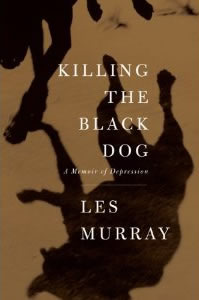Book Notes
 Les Murray, Killing the Black Dog, A Memoir of Depression (New York: Farrar, Straus and Giroux, 2009), 86pp.
Les Murray, Killing the Black Dog, A Memoir of Depression (New York: Farrar, Straus and Giroux, 2009), 86pp.
In 1985 Les Murray (b. 1938) left Sydney and returned to his family roots in a farming valley in order to care for his aging father. The first year went fine, but returning "to live in the place from which I'd always felt displaced" was risky business. In fact, "what I didn't know was that I was heading home in order to go mad… If home conceals Old Bad Stuff you had not mastered the first time around, going back there, perhaps especially as you approach your fifties, is an invitation to crisis."
The first part of this small volume (pp. 1–37) is an eloquent and painful memoir of The Black Dog (Churchill's name for his own depression) — tingling fingers, uncontrollable weeping, panic attacks, cardiac events both real and imagined, the efforts to untangle cause and effect, "victim addiction," inexplicable remissions and recurrences, the drug regimens and numerous hospitalizations. In Murray's experience, parsing a complicated family history proved both necessary and painful. In the end, he concluded that you can never kill The Black Dog, you can only learn about it.
Many critics count Murray as one of the leading poets of the English language. This is his thirteenth book of poetry. Following his prose memoir of depression, the second half of the book is comprised of twenty-five poems (pp. 41–84). The poems give vivid expression to his sickness: "There's a fellow crying in Martin Place. They can't stop him." Or again: "fear, pure, is intransitive." And in "Panic Attack": "The brain was a void / or a blasted-out chamber — / shreds of speech in there, / shatters of lust and prayer." The poems also describe the roots of his depression in acute class consciousness, a complicated relationship with his mother who died in child birth ("Lovemaking brought death"), and bitter memories of the ridicule and cruelty of his classmates, which was "the true curriculum of schools." In the end, and to his credit, Murray enjoys more self-awareness and less self-absorption.
NOTE: For a review of Murray's work see J.M. Coetzee, "The Angry Genius of Les Murray," in the New York Review of Books (September 29, 2011), pp. 64–66.


